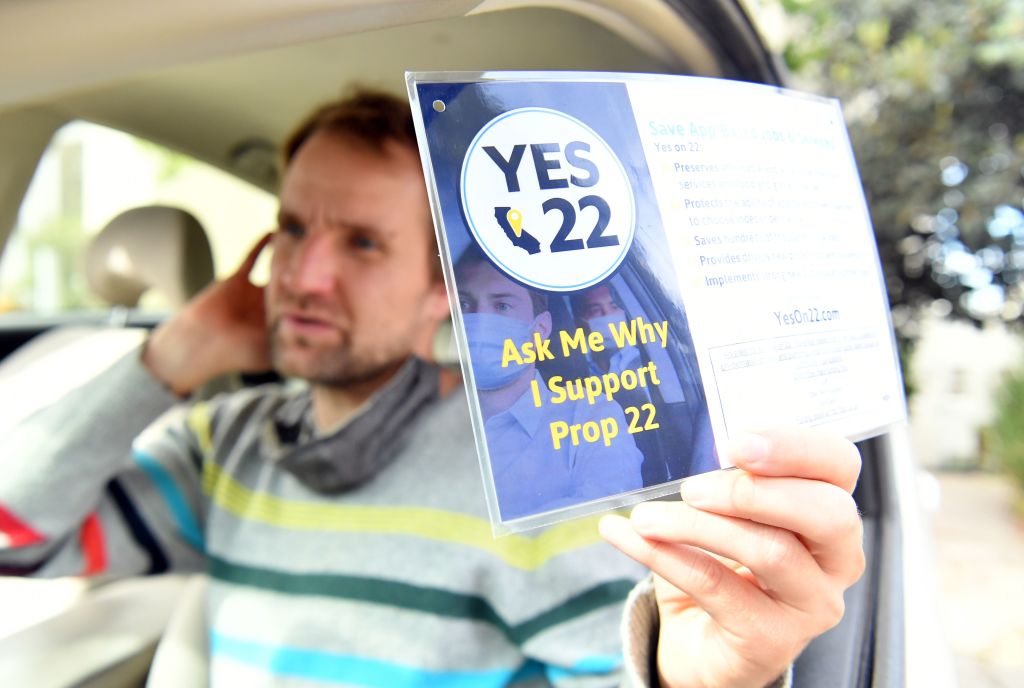When California voters passed Proposition 22 with 58.6% of the vote, they agreed with Uber, Lyft, DoorDash, Instacart and Postmates that gig workers should not be employees who are entitled to myriad labor rights. The proposition they passed stated that gig workers should be independent contractors who receive the limited benefits proposed by those companies.
“The first feeling I had was shock, disbelief and hurt,” Vanessa Bain, a worker-organizer with Gig Workers Collective, told TechCrunch. “It didn’t feel good to think that my fellow Californians voted to strip people like myself and my co-workers of our labor rights.”
But Prop 22 does not mark the end of the battle of the status of gig workers. Gig workers, lawyers and activists affiliated with Gig Workers Rising, Gig Workers Collective, the National Employment Law Project and the Working Partnerships for Families are all gearing up to redouble their efforts in the New Year. But the same goes for gig companies. Uber and Lyft are ready to take legislation similar to Prop 22 into other parts of the country and the world.
In the year ahead, we will likely see lobbying efforts from both gig companies and gig worker organizations alike, as well as more lawsuits.
“We didn’t have time for more grieving because as soon as it passed, every company signaled they’re looking to expand this model to the national level, which means our organizing needs to adjust accordingly,” Bain said.
So, really, the fight has just begun. In the year ahead, we will likely see lobbying efforts from both gig companies and gig worker organizations alike, as well as more lawsuits.
In 2019, the California state legislature passed Assembly Bill 5, which became law in January 2020.
AB 5 mandated that companies apply the ABC test to determine how to classify their workers. According to the ABC test, in order for a hiring entity to legally classify a worker as an independent contractor, it must prove the worker:
- A — is free from the control and direction of the hiring entity.
- B — performs work outside the scope of the entity’s business, and
- C — is regularly engaged in an “independently established trade, occupation or business of the same nature as the work performed.”
Many have argued that gig economy companies do not pass the ABC test, while the companies themselves have, of course, argued that they do. As AB 5 made its way through the state legislature, gig companies banded together with their competitors to fight a collective enemy: labor rights for their respective workforces.
In August 2019, Uber and Lyft kicked off that fight with an initial $60 million put toward the ballot measure now known as Prop 22. Between August 2019 and November 2020, that number skyrocketed to around $205 million and brought in contributions from other companies like Postmates (now owned by Uber), Instacart and DoorDash. All that funding makes Proposition 22 the most expensive ballot measure in California since 1999.

Uber driver Sergei Fyodorov discusses why he supports a yes vote on Proposition 22 in Oakland, California on October 9, 2020. Image Credits: JOSH EDELSON/AFP via Getty Images
On the other side, major donors in opposition of Prop 22 included Service Employees International Union, United Food & Commercial Workers and International Brotherhood of Teamsters. They collectively contributed $15.9 million.
The ballot measure, which goes into effect this month, implements a few key benefits:
- An earnings guarantee of at least 120% of minimum wage while on the job.
- 30 cents per engaged mile for expenses.
- A healthcare stipend.
- Occupational accident insurance for on-the-job injuries.
- Automobile accident and liability insurance.
Ahead of the Prop 22 vote, Cherri Murphy, a ride-share driver for Uber and Lyft and lead organizer at Gig Workers Rising, was heavily involved in Gig Workers Rising’s efforts to combat the millions of dollars tech companies put into ensuring gig workers would be classified as independent contractors.
“We had a hell of a fight,” Murphy told TechCrunch. “We were up against a $205 million campaign but I still had to believe that we could win.”






















